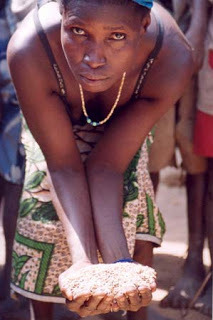Ivy Newton-Gamble's Blog: Everyday African Food, page 16
September 20, 2009
Green African Gourmet Kitchen
[image error]
An eco-friendly kitchen begins with eating organically grown produce. The food you carry in to your home is just as important as the appliances you prepare your meals with, so whenever possible grow your own food. Organic vegetables are not hard to grow. Hearty plants such as okra, sweet potatoes and pole beans grow rapidly. Lettuce is also simple to plant and goes from seed to plate within a few short weeks. Consider the amount of household waste produced by store bought produce vs...
September 18, 2009
The first black female head of state Ellen Johnson Sirleaf

Liberia's' date of independence is in 1847. It is one of the few countries in Africa, and the only country in West Africa, without roots in the European Scramble for Africa. The population of Liberia is roughly 3.49 million (2008) people with a gross domestic product (GDP) per person of $185 a year. Its capital is Monrovia. The inauguration of the first black female head of state of Liberia Ellen Johnson Sirleaf in Africa in 2006 ushered in a period of hope and high expectations for...
September 17, 2009
How to Eat Fufu
 Conventional West African fufu is made by boiling starchy foods as cassava, yam, plantain or rice then pounding them into a gummy mass. fufu is a staple food to Western and Central Africa what mashed potatoes are to traditional European-American cooking. For many Africans, stew and fufu is a classic meal similar to soup and crackers in the US. Cocoyam fufu flour is specialty flour specifically formulated to produce instant fufu. Fufu can be prepared using different basic food materials. It c...
Conventional West African fufu is made by boiling starchy foods as cassava, yam, plantain or rice then pounding them into a gummy mass. fufu is a staple food to Western and Central Africa what mashed potatoes are to traditional European-American cooking. For many Africans, stew and fufu is a classic meal similar to soup and crackers in the US. Cocoyam fufu flour is specialty flour specifically formulated to produce instant fufu. Fufu can be prepared using different basic food materials. It c...
September 16, 2009
Confused about couscous?
Confused about couscous also known as kuskus? The dish is a primary staple throughout North Africa. It's both a name for wheat-grain semolina, appearing in many supermarkets today as simply couscous, and for a spicy chicken-vegetable stew served with cooked semolina that's popular throughout North Africa. Traditional couscous requires considerable preparation time and is usually steamed and fluffed to separate the couscous granules. In many places, a more-processed, quick-cook couscous is...
September 15, 2009
What Defines a Fruit?
What Defines a Fruit?
Author: Peter Gitundu
There is almost a universal confusion between a fruit and a vegetable. Some of the products got from trees qualify as vegetables, while others difficult to classify. Many people believe that vegetables are supposed to be cooked before eating, while their counterparts are eaten raw. Here is where the debate begins because, there are those vegetables that do not require to be cooked before consumption. Do they qualify as fruits then? If we look at...
September 14, 2009
The Continent Of Africa
The Reasons Why You Must Go To The Continent Of Africa
Author: Aria Scherer
When the majority of persons picture the continent of Africa, they posess a preconceived notion that there are savage tribes all over the places and that the whole place is overwhelmed with ferocious animals. Sure that might have been the truth centuries ago, but presently, most portions of the continent of African are no different than Europe or America. You simply need to know where to go to. In fact, the continent...
Introduction to Ethiopian Food
September 13, 2009
Festa d'Africa (Africa festival)
Rome: Festa d'Africa (Africa festival), 8 – 15 September 2009
Author: Michele De Capitani
Many features of African art and culture are not well-known all around the world, and when we think about the black continent our mind goes to its wonderful, exotic landscapes, to its rhythms and to its colours. However, contemporary African art and culture are definitely worth being known and supported, both for their aesthetic value and because they give us the possibility to discover another point of...
June 4, 2009
Zulu Language
[image error]
Zulu is a tonal language. Zulu words my have the same spelling but take on a different meaning depending on the accented tones. Zulu is the language of the Zulu people with about 10 million speakers as a first language and 16 million as a second language. Most speakers of the Zulu language live in South Africa. It became one of South Africa’s eleven official languages in 1994 at the end of apartheid. Like many other Bantu languages, it is written using the Latin alphabet. Official language in S
June 3, 2009
Ethiopia in the Sky with Diamonds
[image error]
In Africa, Ethiopia’s historical pedigree is second only to that of Egypt. The country claims a history going back 5,000 years. Addis Ababa is Ethiopia’s capital city. Addis Ababa means New Flower and its foundation is credited to Queen Taitu -consort to Menelik II. Lake Tana, Ethiopia’s largest lake is the source of the Blue Nile. The lake is dotted with 37 islands hosting some enthralling 13th century churches, monasteries, monuments and archaeological treasures. Of particular interest, is Dek
Everyday African Food
- Ivy Newton-Gamble's profile
- 17 followers



